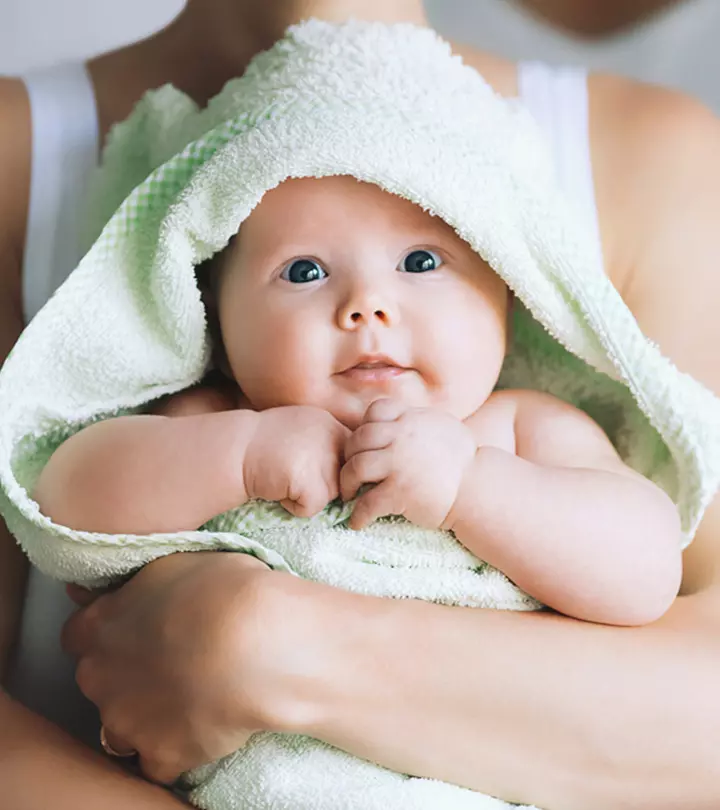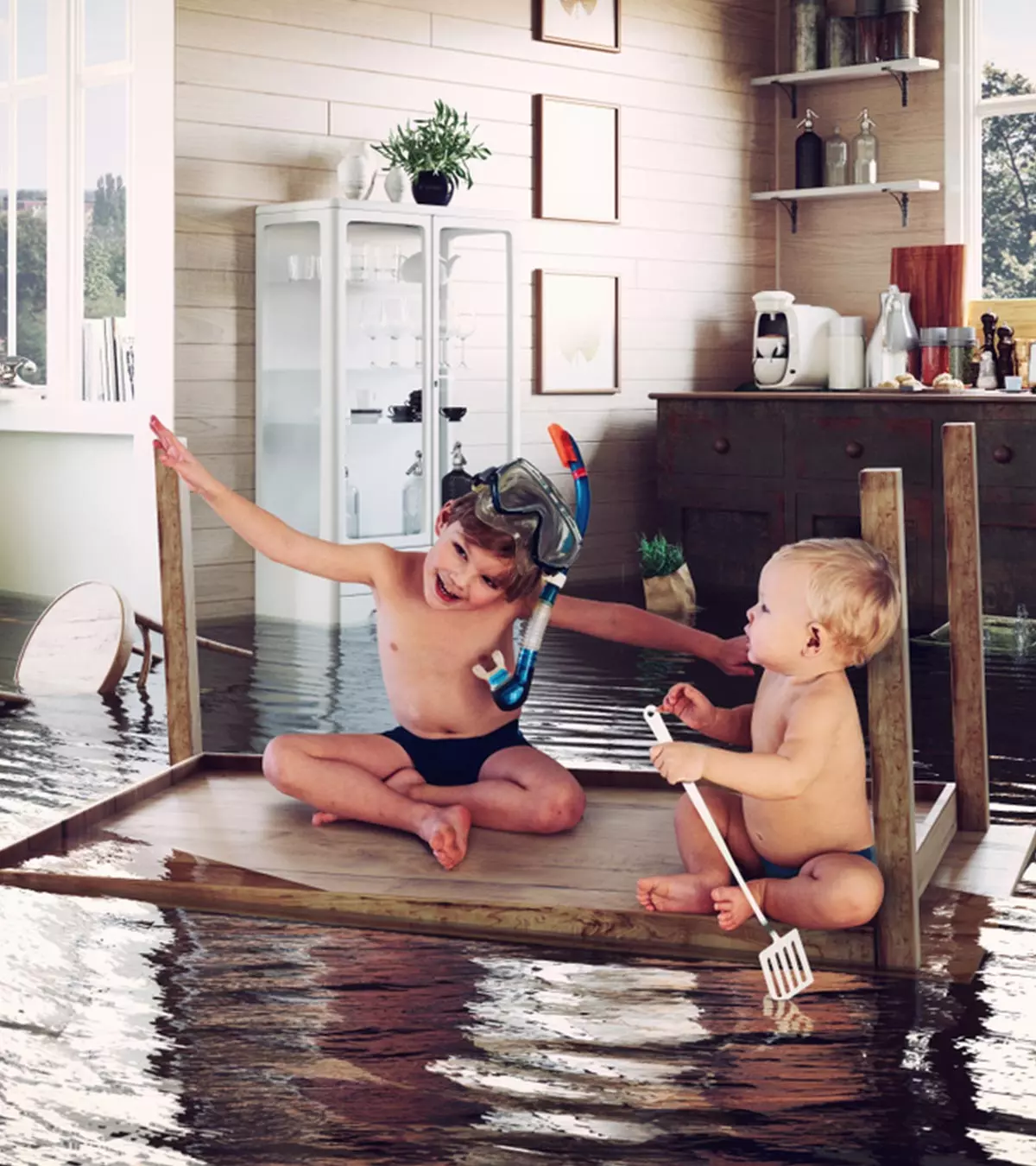
Image: Shutterstock
Bathing is a beautiful experience, especially the first time — you’ll want to create memories as they splash into the tub-filled water! It doesn’t matter whether it’s your first baby or your third: the first bath can be anxiety-ridden. Now that your baby has finally arrived, figuring out a daily routine is crucial for their hygiene and overall health.
New parents may be confused as to when and how often to bathe their newborn. Plus, questions about how comfortable they are and if you’re bathing them the right way could worry you in the initial days. The sheer variety of advice can be pretty mind-boggling but don’t sweat it. We are here with answers that are scientifically-backed! Read on to know more:
Your Baby’s First Bath

Image: Shutterstock
As per the World Health Organization (WHO) recommendations, parents should wait 24 hours to give the first bath to their baby. If cultural reasons necessitate bathing after birth, it should be delayed for a minimum of six hours (1).
What Are The Benefits Of Delayed Bathing After Birth?

Image: Shutterstock
Delaying your baby’s first bath is immensely beneficial, which is why doctors recommend it. Here is why it’s a safe choice for your baby:
1. Regulation Of Temperature

Image: IStock
A sudden contrast in the climate right after delivery (from a fluid-filled environment to a dry one) can cause your baby’s skin to peel and crack. A new study has shown that the first bathing time of an infant after 48 hours can help maintain a steady body temperature and help maintain optimal skin health (2).
2. Improved Breastfeeding Experience

Image: IStock
While hospitals bathe babies earlier, shortly after their birth, studies have shown that bathing the baby right after delivery can cause stress and impact nursing in the early days. Delayed bathing facilitates better skin-to-skin contact between the mother and the baby, decreasing the chances of hypothermia or hypoglycemia (3).
Studies also prove that delayed bathing in newborns can increase the success rate of exclusive breastfeeding. This is because fatty acids in the amniotic fluid contain a sensory cue that directs babies towards the mother’s breasts for feeding. When bathing is delayed, it improves the suckling responses as it retains that sensory cue, making them latch to the mother’s breast (4).
3. Prevents Infections

Image: IStock
Newborns have a natural greasy layer around them right after birth. This is called vernix. It acts like a natural antibiotic that protects them against harmful bacteria and keeps their skin moist and soft. Washing it off right away can exacerbate the risk of infection and cracked skin in newborn babies (5).
Bathing Tips For Your Newborn

Image: Shutterstock
Before you bathe your baby, make sure you have all the essential supplies within your reach. Here are a few important tips you should bear in mind while you bathe them to ensure their maximum care and comfort (6):
- Once you get back home post-delivery, you can bathe your newborn one to two times every week until the umbilical stump falls off (around one or four weeks after birth). It’s good to avoid submerging them in water until that happens.
- Basic cleanups on a flat surface using a baby washcloth are enough to comfort and put your baby in the mood to sleep.
- At this age, unless your baby is covered in dirt, they don’t need to take a daily bath. To ensure that your baby’s skin isn’t irritated, stick to a gentle moisturizer and wash their clothes in chemical-free detergents before you dress them up.
- Take particular care of their face, neck, and the delicate folds (along the neck, wrist, and thighs) of their skin. Also, clean up their fingers and feet as babies tend to suck on them often.
- Doctors also believe that if the umbilical cord stump is intact or your baby’s circumcised male genital organ hasn’t healed, it’s best to avoid a tub bath altogether.
How Often Should You Bathe Your Baby: According To Age

Image: Shutterstock
Your baby’s age and activity will determine how often they need to be bathed. The following guidelines should help you know how frequently you need to bathe them as per their age:
- One To Three Months

Image: IStock
You can switch to a traditional bath from the first month onwards after the umbilical cord stump has fallen off. You can fill your little one’s tub with lukewarm water and wash them gently with baby soap. Use a damp washcloth and pat them dry after the bath. It should keep them warm and comfortable. You could also practice co-bathing with them but be mindful of the water temperature and practice caution until you are out of the shower.
- Three To Six Months

Image: Shutterstock
Between three to six months, your baby can continue the same routine. But if they seem to enjoy bathing, you can increase the frequency of baths. Also, avoid rushing their bath time unless they’re unhappy and wailing (7).
- Six Months Onwards

Image: IStock
As your baby is more mobile now and has ideally started feeding on solids, you could consider giving them frequent baths as long as they enjoy it. If they turn messy while rolling and scooting, you may give them extra bath time but sticking to two to three soapy baths per week is perfectly fine. Allow them to have fun as this will reduce their fear of water. If bath time makes your baby calm and relaxed, include it in their bedtime routine as this could induce peaceful sleep (7).
Bathing your baby the first time is an experience you’ll treasure for life! Even if you don’t get it right the first time, it will eventually become a breeze with these basics. Like everything else, bathing time is a learning experience for your baby and you too! But while you pay attention to the preventive measures, don’t forget to bond with them and soak up the special moments.
Bathing time will soon become a special highlight of the day where you play, cuddle, sing silly songs, kiss, and whisper sweet nothings to express your love for your little one! How was your experience bathing your baby the first time? Do share your stories with us in the comments below!
References
- Postnatal Care for Mothers and Newborns
https://www.who.int/maternal_child_adolescent/publications/WHO-MCA-PNC-2014-Briefer_A4.pdf - First bathing time of newborn infants after birth: A comparative analysis
https://pubmed.ncbi.nlm.nih.gov/30887671/ - Benefits of Delayed Bathing
https://www.jognn.org/article/S0884-2175(18)30125-4/fulltext#relatedArticles - Initiative to Improve Exclusive Breastfeeding by Delaying the Newborn Bath
https://www.jognn.org/article/S0884-2175(18)30391-5/fulltext - Delayed Bathing
https://icea.org/wp-content/uploads/2018/02/ICEA-Position-Paper-Delayed-Bathing.pdf - Washing and bathing your baby
https://www.nhs.uk/conditions/baby/caring-for-a-newborn/washing-and-bathing-your-baby/ - Bathing Your Baby
https://www.healthychildren.org/English/ages-stages/baby/bathing-skin-care/Pages/Bathing-Your-Newborn.aspx
Community Experiences
Join the conversation and become a part of our nurturing community! Share your stories, experiences, and insights to connect with fellow parents.












